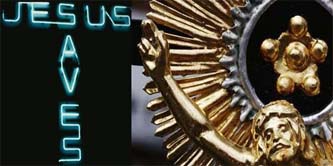Sacraments and historical details of
- Posted by Biblon

The word 'sacrament' has a long history. Going back to its Latin roots we find 'sacramentum' meaning a 'sacred pledge'. Fairly early in the life of the Church the term came to describe those rites which originated in the New Testament. The number of sacraments though differed with different writers:
The number as seven was finally ratified by the Council of Trent (1547), the endorsing normal practice from at least the 12CAD.
In talking about the sacraments, an initial objection, sometimes made, should be dealt with. Christianity, it is said, is a spiritual religion; God is Spirit; we are spiritual beings. What God asks of us is faith, not the performance of specified ceremonies. We are told to worship 'in spirit and in truth'. What place then can outward and material things have in the dealings of Spirit with spirit? How can the pouring of water on the head, or the taking of bread and wine affect the relationship of a being with Being?
The first point to bear in mind is that such objections tend to take the view that the material and external world is not of God; is somehow unimportant and irrelevant to the soul's yearning for God. The Church has never subscribed to such views. The world after all is God's creation and in his eyes was 'very good'. So good that it was worth coming himself in Jesus Christ to save. A glance in the nearest mirror should reassure us that the statement that we as spiritual beings are not the whole story. Humankind is not solely spirit, but spirit linked to, and realizing itself through, the material body. The union of the spiritual and material in the sacraments corresponds to and rests upon the union in humanity.
Sacraments have been called 'an extension of the Incarnation'. Just as Christ took human nature that through it. he might draw near to us, so he still draw near to us in things we can touch and see. The Atonement was wrought on a rough wooden cross with blood. It is not a less spiritual act because it was achieved by physical means in the realm of our space and time. So too Christ still deals with his Church, his people, through outward events in the sacraments.
Only the eye of faith could discern in his death on the cross more than the death of a good and innocent man. So in the sacramental life of Holy Church faith is needed to appropriate the inner spiritual realities of these sacraments to our life situations.
Sacraments too are a necessary constituent of the social aspect of our religion. If anyone wishes to enter a relationship material means are necessary. A smile, a word of greeting, a handshake, all involve the use of material to convey an inner meaning and desire. 'A purely spiritual life, if it were conceivable for a man, would be a life of isolation. '(Bicknell). A purely individual religion may be spiritual, but is not the religion of Jesus Christ.
The Prayer Book Catechism definition of a sacrament is, 'A sacrament is an outward and visible sign of an inward and spiritual grace.' As we discuss the sacraments this definition should be kept in mind. I said earlier that there were seven acts described as sacramental by the Church. Actually the Anglican Church divides these into two groups. First, there are the 'two Sacraments ordained of Christ our Lord in the Gospel, that is to say, Baptism, and the Supper of the Lord.' Then, there are - 'Those five commonly called Sacraments, that is to say, Confirmation, Penance, Orders, Matrimony, and extreme Unction.' These quotations are from the 'Thirty Nine Articles of Religion' of the 1662 Prayer Book. The wording was designed as a political ploy to please the Continental Reformers who accepted only two sacraments, while maintaining the integrity of the Anglican Church as a Church of the Apostolic Catholic tradition, albeit accepting necessary reform.
Copyright Rev'd CanonDenis Moss 2005 and @Simon Harding

Leave your comments
Post comment as a guest